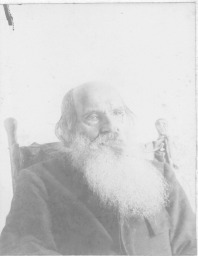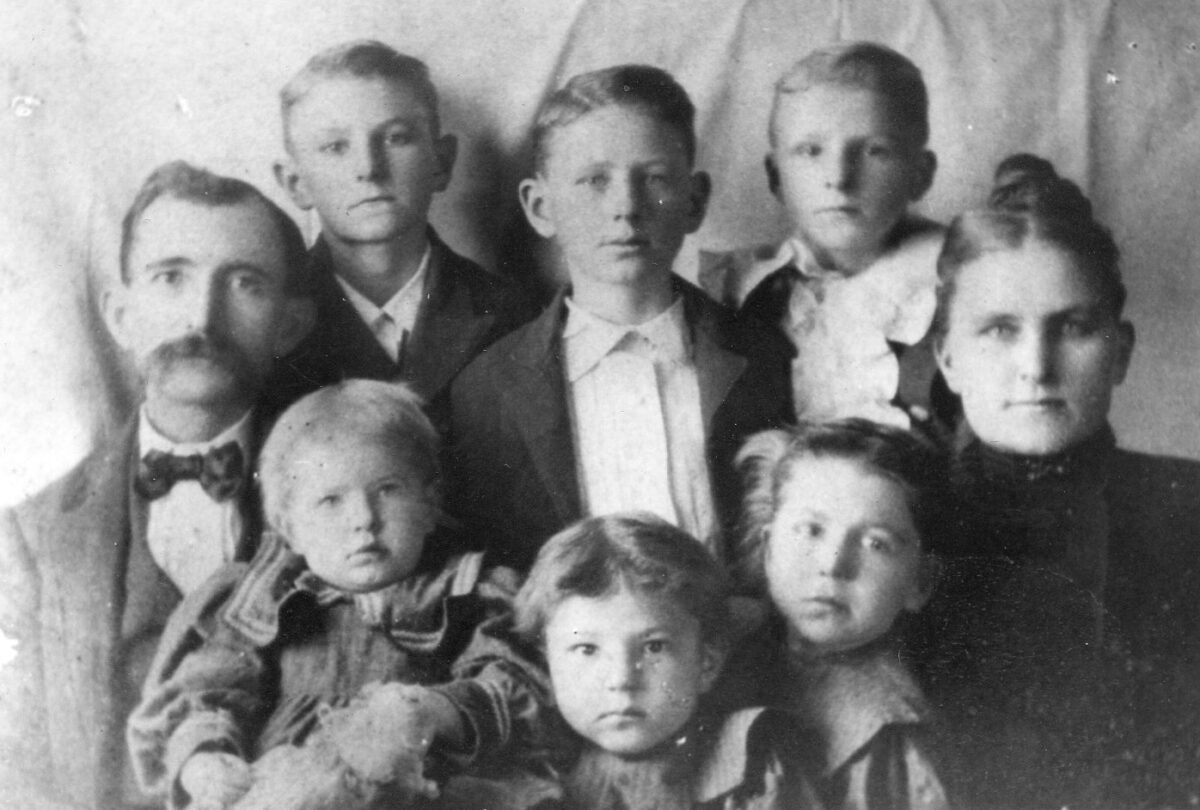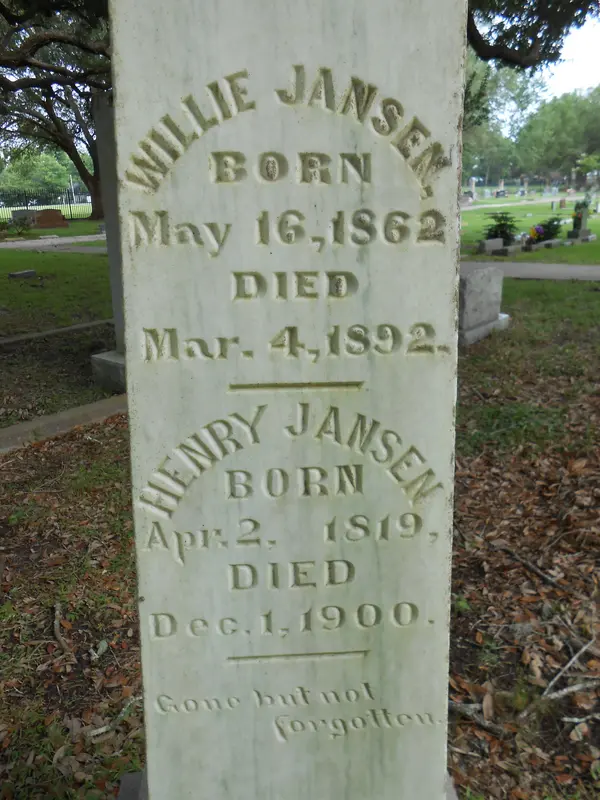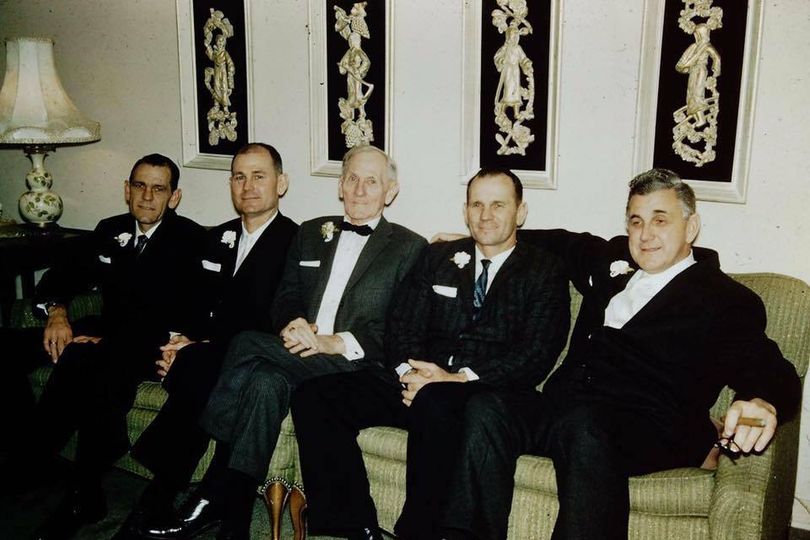![]()
By Thurman M. Gupton
Editor’s Note: Former longtime district judge Thurman Morris Gupton of West Columbia was born on this day, November 11, 1911, 112 years ago in Iago near Boling, Texas. He was the son of Eula Meadows Gupton, a native of Alabama, and former West Columbia Postmaster and longtime area merchant Samuel Morris Gupton who was born and grew up in West Columbia. Judge Gupton was a captain in the U.S. Navy during World War II and served on the Texas Court of Criminal Appeals in Austin prior to his retirement. He and his wife Gladys were very involved in preserving local history for many years. What follows is a biography of Heinrich “Henry” Jansen (1819-1900) and his wife Maria “Mary” Jurgensen Jansen, who were Judge Gupton’s great-grandparents. It was written by Thurman M. Gupton many years ago.
Heinrich Janssen (Henry Jansen) disembarked at the Port of Galveston, Texas, on November 28, 1849, with his personal belongings and family consisting of his young wife, Maria, of 22 years and his two sons, Ludwig, age 4 years and Heinrich Jr., age 1 year. They had sailed a few months earlier on Captain Jurgensen’s Bark the “Colonist” from the port of Hamburg, Germany. On the ship’s manifest, he listed his occupation as a farmer from the country of Holstein. Later he gave his occupation to the 1870 and 1880 census takers of Brazoria County, as a buggy-maker and a carriage-maker; also, he revealed that his and Maria’s home country was Denmark.

He was born April 2, 1819, in Copenhagen, Denmark, and married to Maria Jurgensen in about 1845. Maria was born in the same city on August 14, 1823. After their marriage, they moved to the mainland and settled in a small village named Baden in Schleswig-Holstein, now in North Germany. He operated a blacksmith and carriage shop. Because another civil war was brewing between the Danes and the Germans over this small country, which had happened numerous times in the past, he and Maria decided to move overseas to the newly formed State of Texas. The newspapers advertised Texas as the land of honey with many advantages for immigrants.
While they were in Galveston, Heinrich Jansen learned that the town of Columbia (now West Columbia) in Brazoria County, Texas, and the town of Brenham, Texas, were very prosperous communities. However, they chose to live in Columbia because of the port of East Columbia and the steadily growing population, which was indicative of a good business area.
So, Heinrich and his family settled in the town of West Columbia in 1849. He purchased his first plot of land there on March 6, 1852. On this plot he built his home that he and his family resided in during the remainder of his and Maria’s lives. He immediately built his workshop where he followed his trade as a blacksmith, carriage-maker and furniture maker. His home, shop, wood for furniture and carriages were built from cedar, pin oak and live oak logs from the “Cedar Brake” area in the western part of Brazoria County. In the early colonial days, this was a virgin forest bearing many large cedar trees suitable as lumber for furniture, houses, shingles, etc.

His home was demolished in the 1920s and his workshop was recently demolished (recently referring to when Judge Gupton wrote this biography of his great-grandparents). They were built of hand-hewn cedar logs with some live oak logs. Heinrich Janssen built most of the furniture for the homes of the early settlers in Josiah H. Bell’s Colony and later residents who settled in and near the town of West Columbia and East Columbia.
There are many pieces of his furniture in the homes of his descendants and descendants of early settlers in this area. One of his tester beds is on display in the Hogg Mansion Museum near West Columbia. The writer and his daughter have a desk made by him.
On February 19, 1855, Henry Jansen took an oath before the District Clerk of Brazoria County, Texas, to the effect that “it is his bona fide intention to become a citizen of the United States of America, and he renounces any and all allegiance to every King, Prince, Potentate Power or Sovereignty whatever, and especially renounces all and every allegiance to Frederick the Seventh, King of Denmark of whom he was a subject.”

Five years later his citizenship papers were issued to him by an order of the District Judge of Brazoria County (a role his great-grandson Thurman Gupton would fill many years later), in accordance with the immigration laws of this county. His and Maria’s greatest desire had been accomplished.
Besides building furniture, blacksmithing and carriage making, he raised a sizeable family. In addition to his two sons born in Schleswig-Holstein, Denmark [Ludwig born in 1846 and Heinrich Jr. born in 1848], he and Maria had nine additional children born to their marriage in West Columbia, Texas, including daughter Dorothy born in 1864 and died in 1927 and married to Samuel Doctor Gupton, the writer’s paternal grandparents. Many of these children have long since been deceased and are buried in the Old West Columbia Cemetery.

Although he left his homeland in Schleswig-Holstein, Denmark, to evade a civil war, he became involved in one in Texas and the United States of America. Henry Jansen fought in the War Between the States in the John B. Hood Brigade. In the Battle of the Wilderness he was called from the ranks to mend and rebuild the many gun stocks broken in the “hand-to-hand” fighting between the soldiers of the South and North.
After the Civil War, he returned to his home and spent the remainder of his life in West Columbia. Heinrich “Henry” Jansen passed away on December 1, 1900, and Maria died on January 29, 1905. Both are buried in the West Columbia Cemetery.
